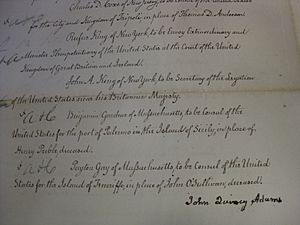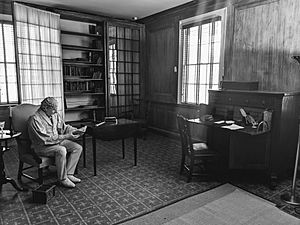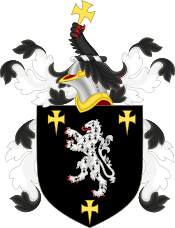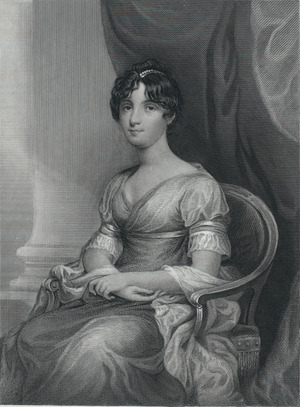Rufus King facts for kids
Quick facts for kids
Rufus King
|
|
|---|---|
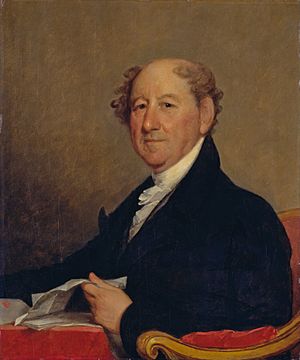
Portrait by Gilbert Stuart, c. 1820
|
|
| United States Senator from New York |
|
| In office March 4, 1813 – March 3, 1825 |
|
| Preceded by | John Smith |
| Succeeded by | Nathan Sanford |
| In office July 25, 1789 – May 23, 1796 |
|
| Preceded by | Seat established |
| Succeeded by | John Laurance |
| United States Minister to the United Kingdom | |
| In office November 11, 1825 – June 16, 1826 |
|
| Nominated by | John Quincy Adams |
| Preceded by | Richard Rush |
| Succeeded by | Albert Gallatin |
| In office July 27, 1796 – May 16, 1803 |
|
| Nominated by | George Washington |
| Preceded by | Thomas Pinckney |
| Succeeded by | James Monroe |
| Personal details | |
| Born | March 24, 1755 Scarborough, Massachusetts, British America (now Maine) |
| Died | April 29, 1827 (aged 72) Jamaica, New York, U.S. (now New York City) |
| Resting place | Grace Episcopal Churchyard |
| Political party | Federalist |
| Spouse | Mary Alsop |
| Children | 10, including James, John, Charles, Edward |
| Education | Harvard University (BA) |
| Signature | |
Rufus King (March 24, 1755 – April 29, 1827) was an important American leader. He was one of the Founding Fathers, a lawyer, a politician, and a diplomat. He helped create the U.S. Constitution in 1787. This document is the main set of rules for how the United States government works.
King represented Massachusetts in the Continental Congress, which was the first government of the United States. He also attended the Philadelphia Convention, where the Constitution was written. After the new government started, he became a Senator for New York. He was a key member of the Federalist Party, one of the first political parties in the U.S. He was even their last candidate for president in 1816.
King came from a wealthy family in Massachusetts. He studied law and then joined the militia during the American Revolutionary War. He served in the Massachusetts government and later in the Congress of the Confederation. At the Constitutional Convention, he pushed for a stronger national government. He helped convince Massachusetts to approve the new Constitution. Later, he moved to New York City and became a Senator for New York.
President George Washington appointed King as the U.S. Minister (like an ambassador) to Great Britain. Even when a different political party took power, King stayed in his role for a while. He ran for Vice-President several times but did not win. He returned to the Senate in 1813 and served until 1825. After his time in the Senate, he was again appointed ambassador to Great Britain, but he became ill and retired. He passed away in 1827.
Contents
Early Life and Family Background
Rufus King was born on March 24, 1755, in Scarborough. At that time, Scarborough was part of Massachusetts, but it is now in Maine. His parents were Isabella and Richard King. Richard King was a successful farmer, merchant, and sea captain. He had earned a good amount of money by the time Rufus was born.
However, some of his neighbors were jealous of his success. When the Stamp Act 1765 was passed, people protested. A group of people attacked Richard King's house and destroyed his furniture. No one was punished for this. The next year, the group even burned down his barn. Because of these events, Richard King became a Loyalist, meaning he supported the British during the American Revolution. But all of his sons, including Rufus, became Patriots and fought for American independence.
Education and Early Career Paths
When Rufus King was twelve, he went to Dummer Academy in Massachusetts. After that, he attended Harvard College and graduated in 1777. He started to study law with a lawyer named Theophilus Parsons.
In 1778, King paused his law studies to join the militia during the American Revolutionary War. He became a major and worked as an aide to General John Sullivan during the Battle of Rhode Island. After the battle, King went back to studying law. He became a lawyer in 1780 and started his own law practice in Newburyport, Massachusetts.
Rufus King's Political Journey
Serving in the Constitutional Convention
Rufus King was first elected to the Massachusetts General Court (their state legislature) in 1783. He served there every year until 1785. From 1784 to 1787, Massachusetts sent him to the Confederation Congress. He was one of the youngest people at these meetings.
In 1787, King was chosen to go to the Constitutional Convention in Philadelphia. This meeting was held to decide how the new United States government should work. Even though he was young, King was an important person at the convention because he was a very good speaker. He worked closely with James Madison and other leaders who wanted a strong national government. King attended every single meeting. He also served on important committees that helped write the final version of the U.S. Constitution.
When King first arrived at the convention, he wasn't sure if big changes were needed to the Articles of Confederation. The Articles were the first set of rules for the U.S., but they made the national government too weak. During the debates, King changed his mind and became a strong supporter of a new, stronger government. He played a big role in writing the Constitution. The Constitution was signed on September 17, 1787, but it still needed to be approved by each state. King went back to Massachusetts and worked hard to get the Constitution approved there. His powerful speeches helped convince people, and Massachusetts became the sixth state to approve the Constitution in early 1788.
Later Political Roles
After his important work at the Constitutional Convention, King decided to change his career. In 1788, he stopped practicing law and moved from Massachusetts to New York City. He quickly became involved in New York politics. At the suggestion of Alexander Hamilton, King was elected to the New York State Assembly in 1789. Soon after, he was elected as a Senator from New York. He was re-elected in 1795.
King was offered the job of Secretary of State, a very important position, but he turned it down. In 1795, he helped Alexander Hamilton defend the Jay Treaty, which was an agreement with Great Britain. King wrote articles for New York newspapers under the name "Camillus" to explain why the treaty was good. He resigned from the Senate in 1796 because President George Washington appointed him as the U.S. Minister to Great Britain. Even though King was a strong Federalist, President Thomas Jefferson (who was from a different party) kept him in this role. King chose to leave the position in 1803.
King then returned to politics in the U.S., but he didn't have much success for a while. In 1804 and 1808, he ran for Vice-President with Charles Cotesworth Pinckney for the Federalist Party. They lost both times to the Democratic-Republican candidates. In 1812, during the unpopular War of 1812 against Great Britain, King tried to get the Federalist Party to nominate a presidential candidate. The party didn't officially nominate anyone, but some people still voted for King, and he finished third. In 1813, King was elected back to the Senate, which was his first big success in ten years.
In 1816, he ran for governor of New York but lost. Later that year, he became the unofficial presidential candidate for the Federalist Party. He lost to James Monroe. King was the last presidential candidate from the Federalist Party before it disappeared as a national party. Even though the Federalist Party was breaking up, King was re-elected to the Senate in 1819. He served another term until 1825. During this time, he continued to speak out against slavery. He believed slavery went against the ideas of freedom in the Declaration of Independence and the Constitution. In 1820, he gave a famous speech against allowing Missouri to become a slave state.
Soon after his second term in the Senate ended, President John Quincy Adams appointed King as minister to Great Britain again. However, King's health was failing, and he had to return home a few months later. He then retired from public life and passed away in 1827.
Rufus King as a Diplomat
Rufus King played a very important role as the U.S. Minister to Great Britain from 1796 to 1803 and again from 1825 to 1826. Even though he was a leading Federalist, President Thomas Jefferson kept him in his job until King asked to leave.
During his time as a diplomat, King helped keep friendly relations between Great Britain and the United States for a while. He also helped reach an agreement on the Jay Treaty. King was also in touch with Francisco de Miranda, a revolutionary from South America, and helped him travel to the United States to seek support for his efforts to free Venezuela.
His Stance Against Slavery
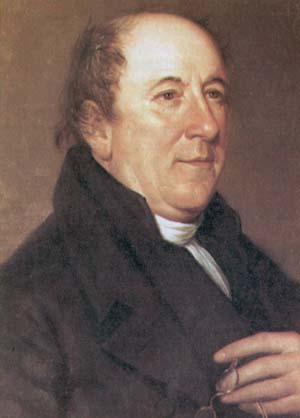
Even though Rufus King owned enslaved people when he was young, he later became a strong opponent of slavery. He was against the expansion of slavery and the slave trade. He believed it was morally wrong and went against the principles of the United States.
While in Congress, he successfully added rules to the 1787 Northwest Ordinance. This law prevented slavery from spreading into the Northwest Territory. He also said he was willing to let slavery continue in states where it already existed, as long as enslaved people could be freed gradually. He called slavery a "wicked institution." In 1817, he supported efforts to end the buying and selling of enslaved people within the U.S. In 1819, he strongly argued against allowing Missouri to become a slave state. His arguments were based on political, economic, and humanitarian reasons. He believed that expanding slavery would harm the ideas of freedom and liberty. After the Missouri Compromise, he continued to support gradually freeing enslaved people. In 1821, he fought against attempts to limit voting rights only to white Americans in New York's Constitution, arguing that it was unconstitutional.
King's Personal Library
When Rufus King passed away in 1827, he had a large library. It contained about 2,200 different book titles in 3,500 volumes. He also had about 200 bound books that contained thousands of smaller writings called pamphlets.
His son, John Alsop King, inherited the library and kept it in Jamaica, Queens. After John's death in 1867, the books went to his son, Dr. Charles Ray King. The books stayed in Pennsylvania until they were given to the New-York Historical Society in 1906. Most of them are still there today. Some of the books have many notes written in the margins by King himself. He also kept six notebooks where he wrote down important thoughts and ideas.
Other Achievements and Contributions
Rufus King was a strong supporter of Alexander Hamilton and his financial plans for the country. King became a director of the First Bank of the United States, which Hamilton helped create.
In 1805, King was elected a fellow of the American Academy of Arts and Sciences. In 1814, he became a member of the American Antiquarian Society. Interestingly, in 1816, he opposed the idea of reopening a Second Bank of the United States, even though he had supported the first one. In 1822, he became an honorary member of the New York Society of the Cincinnati.
Rufus King's Family and Legacy
Many members of Rufus King's family were also involved in politics, and he has many notable descendants today. His brother William King was the first governor of Maine. Another brother, Cyrus King, was a U.S. Representative from Massachusetts.
Rufus King's wife was Mary Alsop. She was born in New York in 1769 and passed away in Jamaica, New York, in 1819. She was the only daughter of John Alsop, a wealthy merchant who was also a delegate to the Continental Congress. Mary was also a great-niece of Governor John Winthrop of the Massachusetts Bay Colony. She married Rufus King in New York City in 1786.
Mary King was known for her beauty, kind manners, and educated mind. She was admired in society and helped her husband in his important roles. One family member wrote about her, "She is vastly the best looking woman I have seen... She is a good hearted woman." The Kings had seven children, and five of them lived to adulthood. Mary King passed away on June 5, 1819, and was buried in the Grace Churchyard. Rufus King said that her life was an example for everyone to follow.
Rufus King died on April 29, 1827. His funeral was held at his home in Jamaica, Queens. He is buried in the Grace Church Cemetery in Jamaica, Queens. The home King bought in 1805 and expanded, along with some of his farm, is now King Manor, a museum open to the public in King Park in Queens. The Rufus King School (P.S. 26) in Fresh Meadows, New York, was named after him. So was Rufus King Hall at Queens College and King Street in Madison, Wisconsin.
Notable Descendants
Rufus King has thousands of descendants and relatives today. Some of the well-known ones include:
- Charles Loring Brace (1826–1890), who founded the Children's Aid Society.
- Fleet Admiral William Frederick Halsey Jr. of the United States Navy.
- Isabella Beecher Hooker (1822–1907), a leader in the women's suffrage movement.
- Charles King, who was the ninth president of Columbia College (now Columbia University).
- John Alsop King, who served as governor of New York.
- Rufus King, a Union brigadier general during the American Civil War.
- Rufus King Jr., a Medal of Honor recipient from the Civil War.
- Alice Duer Miller, an American writer and poet.
- Halsey Minor, who founded CNET.
See also
 In Spanish: Rufus King para niños
In Spanish: Rufus King para niños
 | Claudette Colvin |
 | Myrlie Evers-Williams |
 | Alberta Odell Jones |


